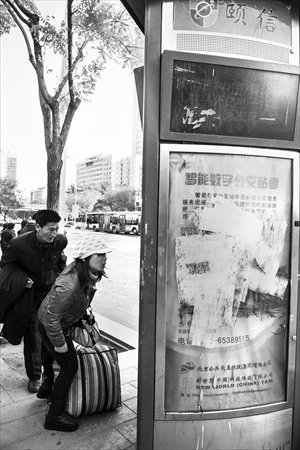
Passengers wait at Dabeiyao bus stop, near Guomao in Chaoyang district on Monday. An LED electronic screen above the billboard, which has never worked, is covered with scratches and graffiti. Photo: Li Hao/GT
More than 300 LED electronic information screens at Beijing bus stops will be replaced by new ones before they were ever put into use, delaying what is an essential public service for the capital's commuters.
The screens were designed to show live timetable updates. New World Technology and Media (NWTM), the owner and service provider for these screens won the contract to install them in 2004.
"It's been many years since we won the contract, and we invested a great sum of money into it. However, we were never authorized to post content. That's why they are still blank," said an employee from the technology department of NWTM, who gave his surname as Kang.
"And now, a new generation of electronic screens made by another company, which are interactive and equipped with touch screens, will be installed to replace ours. It's kind of a waste since ours were not used," said Kang.
Tang Yong, 31 and a lawyer, told the Global Times he has never seen these screens working as he was waiting at Dabeiyaodong stop near Guomao, Chaoyang district, on Monday.
"None of these things worked. This is a huge waste of resources," said Tang.
"I believe other residents also need service from these screens instead of finding them inanimate and covered with layers of flyers," he said.
Dong Xidao, the deputy director of NWTM's Beijing branch, said in 2007 that the company would invest 400 to 500 million yuan ($80 million) to install 6,000 electronic screens by 2008, the Xinhua News Agency reported.
According to the contract, the government would not pay anything for the screens, and NWTM would use advertising fees to support its service. However, the project faced a critical shortage of funds because the company was not allowed to post advertisements.
"We weren't authorized to run advertisements on these screens, and without this revenue we can't guarantee the operation and maintenance of them," Dong told Xinhua in 2007.
Yan Lei, a professor in remote sensing and transport engineering from Peking University, said that this is a service Beijings' commuters need.
"Building up such a network will benefit citizens and reduce the pressure of transportation in Beijing. From a technical perspective there is no difficulty, but both government and companies should cooperate well to save trouble," said Yan.
According to Beijing Public Transportation Bureau, the new generation of interactive electronic screens will be deployed in all bus stops in Beijing by 2015. These billboards will provide real-time timetable information, and information about restaurants, hospitals, pharmacies and toilets, and will also function as a Wi-Fi hotspot.

Copyright ©1999-2011 Chinanews.com. All rights reserved.
Reproduction in whole or in part without permission is prohibited.